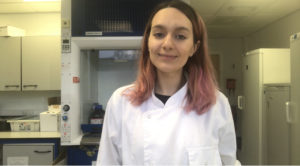When I think back to my school days, I honestly never knew I could have a job doing what I’m doing now. I had no clue you could actually have a job as a scientist who works in a lab – I thought if you did a science degree the only job you’d be able to do was teaching, which I wasn’t sure I wanted to do.

Beth Eyre
However, 10 years later I am now here, a 2nd year PhD student who gets to do what they love every day. My background is in psychology but through my undergraduate and master’s degrees I’ve been slowly moving my way more towards neuroscience research. This move towards neuroscience now means that I work in a lab – something I never got to do before my PhD. Lab research (along with all the other types of research I’ve done) is fascinating. I’ve really enjoyed this next step of my career, so I thought I’d share a couple of reasons why I think you should become a lab-based dementia researcher.
1. The field is exceptionally varied
If you’re someone who has lots of interests and can’t quite pin down one specific area of research that they love more than anything (like me) then the dementia field is for you.
There are numerous brain diseases that lead to dementia which means that the field is exceptionally varied. For example, you could become a lab-based research scientist who investigates neurovascular function in pre-clinical models of Alzheimer’s disease, using living organisms as your research model or you could even use cells to investigate Frontotemporal dementia.
As well as different models to investigate brain diseases that cause dementia there are also many different scientific techniques that can be used to help us learn more about the different causes of dementia. Whether that be imaging techniques to look at the brain or lab techniques that allow us to investigate different proteins within the brain. The varied nature of lab-research is personally what makes it such an exciting field to work in.
2. There is still so much we don’t know
If you’re inquisitive, curious and love the journey of finding out the answers to your questions then dementia research is for you!
Sadly, for the brain diseases that cause dementia there is still no cure. We are rapidly learning more and more about these diseases each day but there is still so much for the scientific community to learn and this is where the next generation of researchers come in!
3. Your research can make a real difference
Before any treatments can be developed there are a number of lab-based stages that need to happen, the basic science studies need to be completed to assess if a compound will be successful, safety studies need to be completed – all of these parts of the research pipeline occur in the lab. This means that your research can make a real impact to not only the scientific community but to the lives of individuals living with dementia and their family members.
One thing I’ve discovered from my move to the lab is how much research is happening right now – which is really encouraging! The variety of the research been done, from different perspectives, using different models of disease and different techniques to investigate the causes of these diseases and how they affect different aspects of brain function is for me really inspirational.
I am so proud to be a lab-based dementia researcher and I honestly believe that through the hard work of all dementia researchers’, treatments will be invented and developed and the lives of individuals living with dementia, their family and carers will be positively impacted.
Author

Beth Eyre
Beth Eyre is a 2nd year PhD Student at The University of Sheffield, researching Neurovascular and cognitive function in preclinical models of Alzheimer’s disease. Beth has a background in psychology, where she gained her degree from the University of Leeds. Inside and outside the lab, Beth loves sharing her science and we are delighted to have her contributing as a regular blogger with Dementia Researcher, sharing her work and discussing her career.
You can follow Beth on Twitter Follow @bethsbrainbites
You can also find Beth on Instagram as BethsBrainBites
View this post on Instagram

 Print This Post
Print This Post





